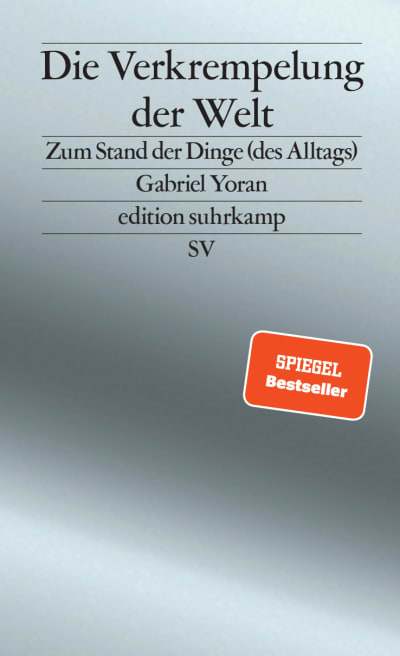A contemporary study of consumer commodities beyond false nostalgia
A Spiegel bestseller, with 30,000 copies sold
The rotating elements on kitchen hobs that allow you to conveniently regulate the temperature are called »knobs«. Of course, anyone who buys an induction hob nowadays will find themselves fumbling around with fickle touch controls. Gabriel Yoran calls such things – which in certain respects are worse than what preceded them – »junk«. Why do these things even exist? Shouldn’t the evolution of products be a linear progression?
Criticising consumer goods is typically seen as...
The rotating elements on kitchen hobs that allow you to conveniently regulate the temperature are called »knobs«. Of course, anyone who buys an induction hob nowadays will find themselves fumbling around with fickle touch controls. Gabriel Yoran calls such things – which in certain respects are worse than what preceded them – »junk«. Why do these things even exist? Shouldn’t the evolution of products be a linear progression?
Criticising consumer goods is typically seen as either an outmoded form of anti-capitalism or an expression of reactionary nostalgia. At the same time, with our purchasing power, we are expected to save the climate or contribute to better working conditions in the Global South. In this context, Yoran looks at objects such as shower hoses and fully automatic coffee machines to seek out the causes for this process of junkification. And he dares to confront the taboo of proposing criteria for what lends legitimacy to certain needs. Yoran does this in a way that is as entertaining as it is informed – and while acknowledging the fact that we, as consumers, are also entangled in these processes of junkification.
»Gabriel Yoran writes clearly and compellingly … Beginning with junk, he ends up at life's big questions. As insightful as it is unsettling.« Sylvia Staude, Frankfurter Rundschau
»This essay is really anything but junk. It is written with wit and verve, and in its pocketbook format, is suited to being carried everywhere, as a handbook.« Paul Jandl, Neue Zürcher Zeitung
»The cover glimmering silver. And that title! There are books I just can’t walk past.« Bettina Cosack, Berliner Zeitung
»Yoran’s book is as intelligent as it is hilarious...« Christian Schröder, Der Tagesspiegel
»A book that is utterly devoid of junkification! « WELT AM SONNTAG
»With humour and an incorruptible eye for usability, [Gabriel Yoran] has helped to give a new sheen to the dusty genre of commodity critique.« Heike Karen Runge, Jungle World
»[The Junkification of the World] took the words right out of my mouth… A highly illuminating book.« Deutschlandfunk Kultur - LESART
»In his book, Yoran touches on the diffuse discontent that must have snuck into the minds of many people after buying the latest generation of this or that product.« Simon Emmerlich, BR Kultur
»In The Junkification of the World, Yoran looks into the zeitgeist that governs contemporary design decisions.« Jens Ulrich Eckhard, DIE WELT
»... Commodity critique of the most entertaining kind...« Ö1
»[A] fantastic example of commodity critique that everyone should read. ...[A] miracle of a book...« Bernhard Heckler, Tages-Anzeiger
Gabriel Yoran has written a really great book...« linksdings
»Yoran encourages readers to hone their gaze, whether it’s for the smallest junky gimmick or the big gears of industry.« Gerlinde Pölsler, Der Falter
»Gabriel Yoran writes clearly and compellingly … Beginning with junk, he ends up at life's big questions. As insightful as it is unsettling.« Sylvia Staude, Frankfurter Rundschau
»This essay is really anything but junk. It is written with wit and verve, and in its...
Persons
Gabriel Yoran
OTHER PUBLICATIONS

Classical Music through the Side Door
Spanish world rights (Akal)


